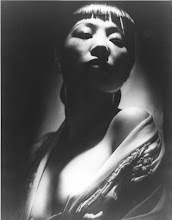Full Text :COPYRIGHT 2004 Heldref Publications
Chan, Anthony B. Perpetually Cool: The Many Lives of Anna May Wong (1905-1961) Lanham, MD: Rowman and Littlefield 320 pp., $45.00 ISBN: 0-8108-4789-2 Publication Date: November 2003
In Anthony B. Chan's timely book, Hollywood screen icon Anna May Wong is resurrected and reinterpreted for a new generation that may be unfamiliar with American's first genuine Chinese American movie star. Wong was a household name around the world in the 1920s and 1930s, first as a silent film star in such classics as Toll of the Sea (1922) and the British production Picadilly (1929). In 1932, she would win rave reviews as Marlene Dietrich's co-star in Shanghai Express, directed by the great Josef von Stemberg. An icon of glamour and "exotic" beauty, her image was used to sell everything from cigarettes to fashion, yet Hollywood never quite knew what to do with Wong and her later career in film never matched the quality or promise of Shanghai Express. In China and America, Wong was denounced for portraying stereotypical "exotic" images of Chinese women, from a sexy seductress in Douglas Fairbanks's The Thief of Baghdad (1924) to "dragon lady" types--for example, in the Fu Manchu film Daughter of the Dragon (1930). Such negative and simplistic readings of Wong's career unfortunately have persisted into the present.
Chan's excellent book rescues Wong from both of these stereotypes and shows what a resourceful and talented actress she really was and how she fought the stereotypes imposed on her by a racist society. He notes that when Wong tired of playing secondary roles to white women who were done up in "yellow face," makeup meant to make them look Chinese but which actually succeeded in making them look inhuman, Wong went to Europe and filmed a number of successful films for British and German studios, who were anxious to compete with Hollywood. She learned to speak a multitude of European languages so that she could perform in plays and cabaret routines in which she sang, danced, and recited Chinese poetry and folksongs in her parents' native Taishanese dialect. Toward the end of her career, after returning to the United States, she turned down demeaning secondary roles and went to China where she filmed a documentary to show America what China was really like. She was also very active in providing funds for the Chinese victims of the Japanese invasion throughout World War II, donating the proceeds of two of her films to this effort. She also briefly starred in a television series and was set to make a Hollywood comeback in Flower Drum Song when she died in 1961 at the age of fifty-six.
Some academic essays have portrayed Wong as a perpetual victim. Certainly she did face her share of racism--she was notably denied the starring role in the film version of Pearl Buck's bestseller The Good Earth (1937), which European actress Luise Rainer played instead. But as Chan points out in his excellent research into her multifaceted career, Wong created a career for herself that was unattainable to most other Asian Americans at that time. She was tireless in thinking of ways to work as an actress, whether Hollywood recognized the depth of her talent or not. She managed to earn enough money to support her many siblings and to send them to college--even though she herself dropped out of high school in order to pursue an acting career. She was also brilliant in promoting her ventures--no small feat!--and creating a sophisticated image for herself (and Chinese women as well) at a time when most images in America portrayed Chinese as buck-toothed, slit-eyed, and decidedly unglamorous.
Unlike other current books on Anna May Wong, Chan quotes Wong extensively, allowing her to speak for herself in describing her motivations and desires. Wong, known for her wit, comes across as intelligent and sophisticated, certainly not as anybody's victim.
Chan's book Perpetually Cool: The Many Lives of Anna May Wong would be a welcome edition to any library's Asian American and film collections and would be appropriate for both undergraduate and graduate students.
Chan is an associate professor of communications at the University of Washington, Seattle.

No comments:
Post a Comment